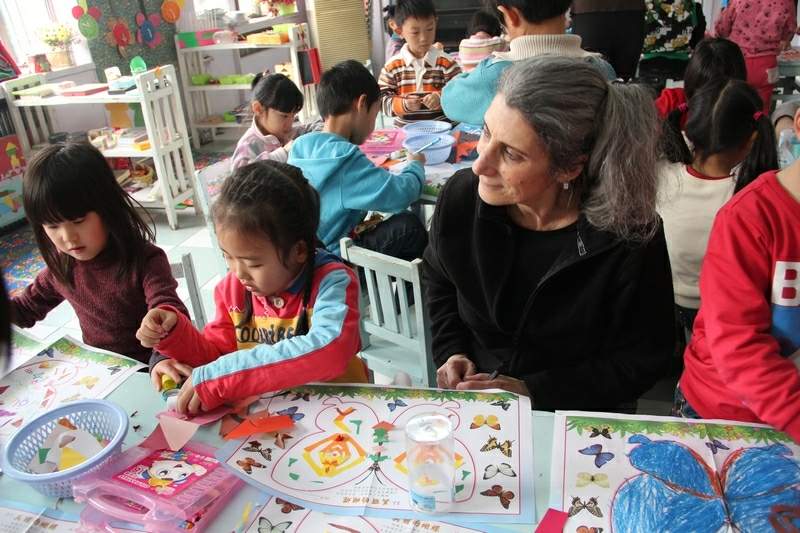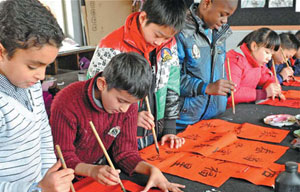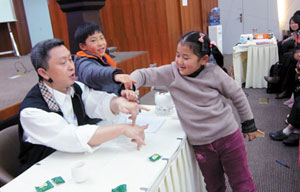Western teaching methods expand young minds
Updated: 2013-04-11 15:55
By Wang Yuke (China Daily)
|
||||||||
 |
|
Michele Reich from the University of Pennsylvania observes students at work at Tianjin University Kindergarten.[Photo/China Daily] |
Dressed warmly and clutching drawing boards, a dozen young boys and girls are scattered throughout the kindergarten's yard staring intently at the trees. After much contemplation the children draw furiously on their boards, making a visual document of the scene before them.
The students of Tianjin University Kindergarten are taking a science class.
Science is not part of the teaching curriculum in most Chinese kindergartens, but Tianjin University Kindergarten has introduced a program designed by the United States Ace Academy to foster critical thinking and encourage learning through first-hand experience.
Michele Reich from the University of Pennsylvania recently held the first outdoor demonstration class. She assigned the children the task of observing the trees and drawing what they saw. The children had to consider the tree closely, looking at the branches, leaves and fruits, its height and its shape.
"Please draw only what you see and don't add your imagination," Reich reiterated.
The children fanned out to their assigned tree, observed and exchanged ideas with their classmates. Reich moved between the students, giving instructions to each group and encouraging the children to look at the trees in different ways.
"You can touch the trunk," she told the students. "How does it feel?"
"It's smooth," said one group, while another described it as "parched and tough". The children considered all details, even the tiny black spots on the trunks.
"Kids' creativity is quite developed in China as teachers here commit considerable time and energy to it. But Chinese kids have a lot of room to shape a science brain which means discerning details and reaching the truth through contemplation," Reich says. According to Reich, a scientist's success lies in acute observation, and solving a problem based on what is perceived.
Chelsea Bailey, a PhD in Early Childhood Education at New York University who works as an education advisor, says Chinese children lack critical thinking.

 'Taken 2' grabs movie box office crown
'Taken 2' grabs movie box office crown
 Rihanna's 'Diamonds' tops UK pop chart
Rihanna's 'Diamonds' tops UK pop chart
 Fans get look at vintage Rolling Stones
Fans get look at vintage Rolling Stones
 Celebrities attend Power of Women event
Celebrities attend Power of Women event
 Ang Lee breaks 'every rule' to make unlikely new Life of Pi film
Ang Lee breaks 'every rule' to make unlikely new Life of Pi film
 Rihanna almost thrown out of nightclub
Rihanna almost thrown out of nightclub
 'Dark Knight' wins weekend box office
'Dark Knight' wins weekend box office
 'Total Recall' stars gather in Beverly Hills
'Total Recall' stars gather in Beverly Hills
Most Viewed
Editor's Picks

|

|

|

|

|

|
Today's Top News
Boston bombing suspect reported cornered on boat
7.0-magnitude quake hits Sichuan
Cross-talk artist helps to spread the word
'Green' awareness levels drop in Beijing
Palace Museum spruces up
First couple on Time's list of most influential
H7N9 flu transmission studied
Trading channels 'need to broaden'
US Weekly

|

|









